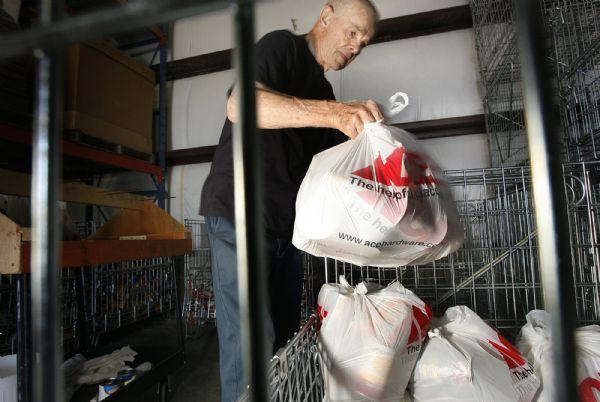This is an archived article that was published on sltrib.com in 2009, and information in the article may be outdated. It is provided only for personal research purposes and may not be reprinted.
Bountiful » The smartly dressed woman behind the wheel of a new Cadillac didn't drive up to the Bountiful Community Food Pantry to drop off a cash donation or to volunteer.
She quietly stepped into the office to get her own bag of groceries that are regularly handed out to the needy. As she chatted with a nonpaid staffer, it soon became apparent that she was in a borrowed car, on her way to a job interview.
"You learn never to make assumptions," said longtime volunteer Craig Cobb. "There's no one description you can give of people in need."
Cobb helps organize the 200,000 pounds of food stored in the warehouse, often doubling as a forklift operator. He's one of a dozen or so volunteers who help supervise the hundreds of people who come to the pantry to sort, organize and rotate boxes and pallets of food.
Jaynann Johnson, who hands out items to those in need, says it's not unusual to see expressions of embarrassment or relief when she asks them what type of frozen meat they prefer from the freezer, just behind the main counter.
"Some people just break down in tears," she said. "I give them a hug and say, "Hey, we're just neighbors helping neighbors.' ''
Until last fall, frozen meat cuts were so rare that a family of four received one pound of ground hamburger and a single package of hot dogs -- for the month.
But in November, Smith's Marketplace in Salt Lake City began giving fresh and prepared food nearing expiration dates to Utah Food Bank Service, which in turn distributed it to neighborhood pantries statewide.
Bountiful Pantry director of operations Dave Karcher calls the program miraculous. Now, instead of the grocer discarding meats, dairy, produce and other perishable items on the "sell by" date, the food is given to the needy.
"It took a look of effort and work to get through liability issues," he said of the program. "And then it took equipment such as freezers and refrigerated trucks, as well as food handlers licenses, to get the food from the supermarkets to the food pantries."
Meats, for instance, are immediately frozen, picked up by refrigerated trucks and stored in freezers to maintain a constant temperature. Needy families may now enjoy a roast beef dinner, fish, chicken and other cuts that in the past neither they nor the pantry could afford. Now pantries can use cash donations to purchase other needed items such as fresh milk with money that would have been spent for meat.
Smith's Grocery Rescue program has expanded to 39 of Smith's stores in Utah. About 45 percent of the donated foods are bakery items, 41 percent produce and the 14 percent are meat, cheese and other perishable items.
"Our goal is to capture nutritious items like meat, produce and dairy that are safe yet unsellable and help local pantries feed hungry people with well-balanced meals," said Smith's spokeswoman Marsha Gilford.
Still, the needs are great at the Bountiful Pantry. The number of individuals served in March 2006 totaled 720, compared with 1,568 last March. Summer is a particularly difficult time for the pantry after food drives have been completed. Donations won't pick up again until the Thanksgiving holiday season, leaving volunteers to worry and sometimes scramble in the ensuing months.
Kathy Jones, who volunteers about 30 hours weekly, remembers dividing up baby wipes into sandwich-sized plastic bags because there weren't enough boxes to hand out to parents. Diapers also can run low -- as can incontinence products for older individuals. And, there's always a need for cooking oil, sugar, ketchup, mayonnaise -- as well as the old standby, canned goods.
Since Smith's unveiled its Grocery Rescue program, other stores, such as Albertsons, Target, Wal-Mart and Costco, have joined in the effort to pass along groceries nearing expiration dates.
By July 1, Smith's expects to have all its 48 Utah stores participating in the program, which will triple the amount of the chain's overall donation efforts.
Grocery Rescue is a business partnership between grocery chains and Feeding America, formerly called America's Second Harvest, the nation's largest domestic hunger-relief charity.
Smith's parent company, Kroger, which works closely with Feeding America, has donated more than 135 million pounds of food and groceries, valued at more than $200 million, to more than 85 local food banks during the past five years.
dawn@sltrib.com" Target="_BLANK">dawn@sltrib.com
Mail donations to Box 38, Bountiful, UT, 84011.
Drop off canned goods or volunteer at the pantry, 480 E. 150 North.
Hours of operation are 10 a.m. to noon, Monday and Friday; 6 p.m. to 8 p.m. Tuesday and Thursday; 10 a.m. to 1 p.m. Saturday.
For information, call 801. 299-8464
Supermarkets donate meats, dairy, produce and bakery items that are nearing expiration dates.
Utah Food Bank delivers the perishable items to a statewide emergency food network.
Two trailers with cooling equipment bring perishable food to rural areas.



